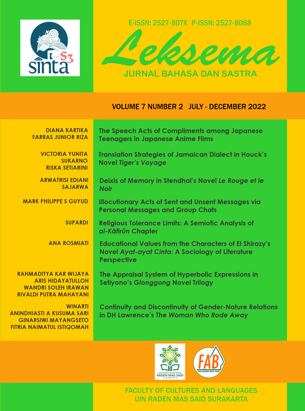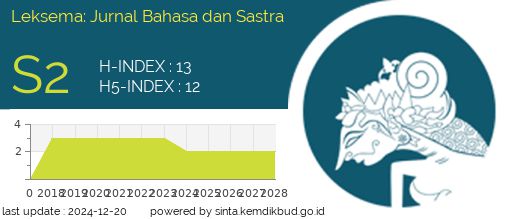CONTINUITY AND DISCONTINUITY OF GENDER-NATURE RELATIONS IN DH LAWRENCE'S 'THE WOMAN WHO RODE AWAY'
DOI:
https://doi.org/10.22515/ljbs.v7i2.5751Keywords:
continuity, ecofeminism, gender, natureAbstract
Oppressions of nature and gender are two things that are interrelated. Both require a struggle that leads to the liberation of nature and women called ecofeminism. The Gender-nature relations can be found in literary works as reflections of the reality that surrounds the author. Through literary works, issues related to gender and nature are raised by the author as a form of ecofeminist struggle, that all forms of damage done by humans to nature will have an impact on the preservation of nature in the future. The objective of this study was to find out the continuity and discontinuity between nature and gender as part of the ecofeminism discourse in the short story The Woman Who Rode Away written by DH Lawrence. The method used to collect data was observation through close reading to both the story, as the primary data source, and other texts from journals and reference books as the secondary data sources. The result shows that the narratives of ecofeminism are evident in the fiction. The story tells the position of men as the masters in nature who have the power over all things. The depiction of male characters as the figures who tend to oppress women becomes a part of discontinuity toward nature in the story. This is different from the depiction of the female character who is considered as a caretaker of nature and is able to build a continuity of harmonious relationship between human and nature. In conclusion, the story reflects unbalanced relationships between gender and nature.
Downloads
References
Bennett, Andrew & Nicholas Royle. 2004. Introduction to Literature, Criticism, and Theory: Third Edition. London: Pearson Educated Ltd.
Capra, Fritjof. 1996. The Web of Life. A New Understanding of Living Systems. New York: Anchor Books
Das, Srijana Mitra. 2020. “Women and Nature Share a Powerful Moral Connection”. http://timesofindia.indiatimes.com/articleshow/74013986.cms?utm_source=contentofinterest&utm_medium=text&utm_campaign=cppst. Accessed on October 4, 2022
de Beauvoir, Simone. 2011. The Second Sex (Vintage Book Edition). New York: Random House
Fakih, Mansour. 2008. Analisis Gender dan Transformasi Sosial. Yogyakarta: Pustaka Pelajar
Hawkins, Ronnie Zoe. 1998. “Ecofeminism and Nonhumans: Continuity, Difference, Dualism, and Domination”. Hypatia 13 (1): 158-197. http://www.jstor.org/ stable/3810611, Accessed on July 15, 2022
Humm, Maggie. 1986. Feminist Criticism. Brighton: The Harvester Press
Irigaray, Luce. 1987. Speculum of the Other Woman. (Trans.: GC Gill). Ithaca: Cornell University Press
Kail, Robert V & John C Cavanaugh. 2022. Human Development: Life Span View (Ninth Edition). Boston: Cengage
Khotimah, Khusnul. 2008. Perempuan dan Pembangunan Lingkungan. Jakarta: Rahima Jakarta
Lawrence, DH. 2004. The Woman Who Rode Away. https://gutenberg. net. au/ ebooks04/0400301h.html. Accessed on July 18, 2022
Plumwood, Val. 2003. Feminism and the Mastery of Nature. London: Routledge
Rahayu, Angger Wiji. 2015. “Perempuan dan Belenggu Peran Kultural”. Jurnal Perempuan. https://www.jurnalperempuan.org/wacana-feminis/perempuan-dan-tangan-peran-kultural. Accessed on July 17, 2022
Shiva, Vandana. 2016. Staying Alive: Women, Ecology, and Development. California: North Atlantic Books
Sumarsono. 2004. Filsafat Bahasa. Jakarta: Grasindo
Tong, Rosemarie. 2009. Feminist Thought: A More Comprehensive Introduction. Boulder: Westview Press
Udasmoro, Wening. 2011. Pengantar Gender dalam Sastra. Yogyakarta: Unit Penerbitan Fakultas Ilmu Budaya
Vakoch, Douglas A and Sam Mickey. 2018. Women and Nature? Beyond Dualism in Gender, Body, and Environment. London: Routledge
Warren, Karen J. 1997. Ecofeminism: Women, Culture, Nature. Bloomington: Indiana University Press
Wolfreys, Julien et al. 2006. Key Concepts in Literary Theory. Edinburgh: Edinburgh University Press
Downloads
Published
Issue
Section
License
Copyright (c) 2022 Leksema: Jurnal Bahasa dan Sastra

This work is licensed under a Creative Commons Attribution-NonCommercial-ShareAlike 4.0 International License.
The copyright of the received article shall be assigned to the publisher of the journal. The intended copyright includes the right to publish the article in various forms (including reprints). The journal maintains the publishing rights to published articles.
In line with the license, the authors and users (readers or other researchers) are allowed to share and adapt the material only for non-commercial purposes. In addition, the material must be given appropriate credit, provided with a link to the license, and indicated if changes were made. If authors remix, transform or build upon the material, authors must distribute their contributions under the same license as the original.







